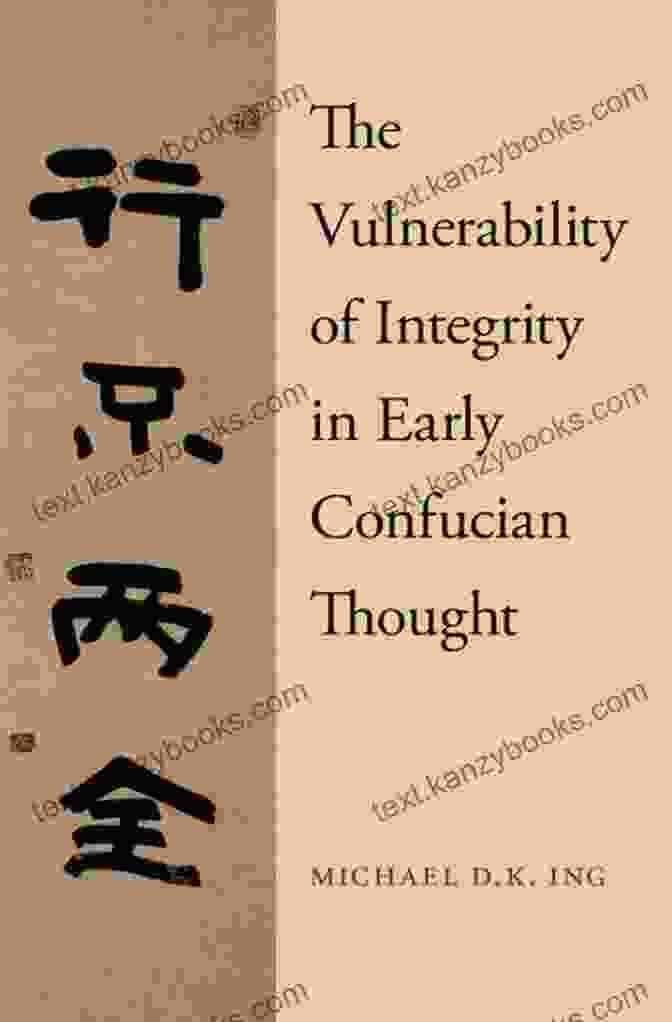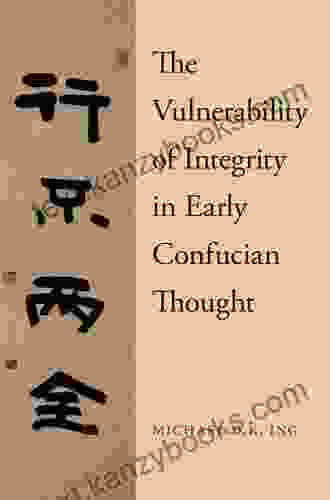Unveiling the Fragility of Integrity in Early Confucian Ethics


In the tapestry of human history, integrity has emerged as a cornerstone of moral conduct, a beacon of ethical virtue that guides our actions and shapes our character. The Confucian tradition, with its profound influence on East Asian thought, has placed a paramount emphasis on the concept of integrity, recognizing its pivotal role in fostering harmony within individuals and society.
5 out of 5
| Language | : | English |
| File size | : | 1716 KB |
| Text-to-Speech | : | Enabled |
| Enhanced typesetting | : | Enabled |
| Print length | : | 305 pages |
| Lending | : | Enabled |
| Screen Reader | : | Supported |
This article delves into the complexities of integrity in early Confucian thought, exploring its multifaceted nature and the challenges it faced. Through a comprehensive analysis of key texts and philosophical insights, we will uncover the vulnerability of integrity in this early period, shedding light on its delicate balance and the factors that threatened its preservation.
The Confucian Concept of Integrity
In the Confucian lexicon, integrity, known as "ren" (仁),encompasses a broad spectrum of virtues that define the ideal human being. It entails a deep-seated benevolence, a profound concern for others, and a steadfast commitment to ethical principles. 仁 embodies the essence of humanity, the qualities that distinguish us from mere animals and elevate us to the realm of moral agency.
Early Confucian thinkers believed that integrity was not merely an abstract concept but a concrete reality that manifested in every aspect of life. It was not enough to possess the knowledge of what was right or wrong; one had to embody those principles, to live them out in action and word.
The Fragility of Integrity
While the Confucian tradition extolled the virtues of integrity, it also recognized its vulnerability. The early Confucian thinkers were acutely aware of the challenges that faced individuals in upholding their moral principles.
External Pressures
One of the primary threats to integrity stemmed from external pressures. In a society marked by widespread corruption and moral decay, it was often difficult to remain steadfast in one's convictions. The allure of power, wealth, and social status could tempt even the most virtuous individuals to compromise their principles.
Confucius himself acknowledged this challenge, lamenting the "many who abandon the Way because of poverty and many who abandon it because of riches." The external pressures of material want and social temptation could erode the resolve of even the most well-intentioned individuals.
Internal Conflicts
Integrity was also vulnerable to internal conflicts. The human psyche is a complex and often contradictory entity, with our desires, emotions, and reason vying for control. The pursuit of self-interest could conflict with the demands of morality, creating inner turmoil and the potential for moral compromise.
Mencius, another prominent early Confucian philosopher, recognized the challenges of reconciling one's desires with the Way of 仁. He argued that human nature is inherently good, but that our desires can lead us astray. It is through the cultivation of virtues like 仁 and righteousness (义) that we can align our desires with morality and preserve our integrity.
The Role of Shame
In Confucian thought, shame played a significant role in safeguarding integrity. Shame, or "li" (礼),was a powerful force that reinforced social norms and ensured conformity to ethical standards. The fear of public disapproval and social ostracism could motivate individuals to act in accordance with societal expectations, even when their personal desires conflicted.
However, the reliance on shame as a deterrent to moral transgression could also be problematic. The threat of public shame could lead to superficial conformity rather than genuine moral transformation. Individuals might act virtuously out of fear of social consequences rather than a deep-seated commitment to ethical principles.
Preserving Integrity
Despite the challenges facing integrity in early Confucian thought, the Confucian philosophers offered practical guidance on how to cultivate and preserve this vital virtue.
Self-Cultivation
Confucius emphasized the importance of self-cultivation, or "junzi" (君子),as the path to preserving integrity. The junzi was the ideal Confucian gentleman, a person who embodied the virtues of仁and other ethical principles. Self-cultivation involved a continuous process of self-reflection, study, and moral practice.
Through self-cultivation, individuals could develop the inner strength and resolve to withstand external pressures and internal conflicts. They could learn to control their desires, align their actions with morality, and live in accordance with the Way of仁.
Education
Education played a crucial role in fostering integrity in early Confucian society. Confucius established a school where he taught students the principles of仁, righteousness, and other virtues. Through education, individuals could gain the knowledge and wisdom necessary to make informed moral decisions and to navigate the challenges of life with integrity.
Social Support
Confucius also emphasized the importance of social support in preserving integrity. He taught that individuals should surround themselves with like-minded companions who shared their values and aspirations. By supporting and encouraging one another, individuals could create a virtuous community that reinforced ethical behavior and provided a bulwark against external pressures.
The concept of integrity in early Confucian thought is a complex and multifaceted one. The Confucian philosophers recognized the profound importance of integrity, but they also acknowledged its vulnerability to external pressures, internal conflicts, and the limitations of shame. Nevertheless, they offered practical guidance on how to cultivate and preserve this vital virtue through self-cultivation, education, and social support.
The study of early Confucian ethics provides us with valuable insights into the nature of integrity and the challenges it faces. By understanding the Confucian perspective on this fundamental virtue, we can gain a deeper appreciation of the complexities of human morality and the importance of cultivating integrity in our own lives.
5 out of 5
| Language | : | English |
| File size | : | 1716 KB |
| Text-to-Speech | : | Enabled |
| Enhanced typesetting | : | Enabled |
| Print length | : | 305 pages |
| Lending | : | Enabled |
| Screen Reader | : | Supported |
Do you want to contribute by writing guest posts on this blog?
Please contact us and send us a resume of previous articles that you have written.
 Book
Book Novel
Novel Page
Page Chapter
Chapter Text
Text Story
Story Genre
Genre Reader
Reader Library
Library Paperback
Paperback E-book
E-book Magazine
Magazine Newspaper
Newspaper Paragraph
Paragraph Sentence
Sentence Bookmark
Bookmark Shelf
Shelf Glossary
Glossary Bibliography
Bibliography Foreword
Foreword Preface
Preface Synopsis
Synopsis Annotation
Annotation Footnote
Footnote Manuscript
Manuscript Scroll
Scroll Codex
Codex Tome
Tome Bestseller
Bestseller Classics
Classics Library card
Library card Narrative
Narrative Biography
Biography Autobiography
Autobiography Memoir
Memoir Reference
Reference Encyclopedia
Encyclopedia Peggy Porschen
Peggy Porschen Nicole Parsons
Nicole Parsons William Giraldi
William Giraldi Morris Chestnut
Morris Chestnut Scott Floman
Scott Floman Tessa Barton
Tessa Barton Mary Kathleen Rose
Mary Kathleen Rose Ronald Bradford
Ronald Bradford Rebecca Loach
Rebecca Loach Matt Hackett
Matt Hackett Michael Gesellchen
Michael Gesellchen Megan Harris
Megan Harris Nancy Dufresne
Nancy Dufresne Mary Beth Ingham
Mary Beth Ingham Megan Brooks
Megan Brooks Ron Kohavi
Ron Kohavi Melinda Bryan
Melinda Bryan William Ciocco
William Ciocco Rachel Held Evans
Rachel Held Evans Marvin Terban
Marvin Terban
Light bulbAdvertise smarter! Our strategic ad space ensures maximum exposure. Reserve your spot today!
 Sean TurnerFollow ·17.4k
Sean TurnerFollow ·17.4k Franklin BellFollow ·2.9k
Franklin BellFollow ·2.9k Dave SimmonsFollow ·4.3k
Dave SimmonsFollow ·4.3k Billy FosterFollow ·2.2k
Billy FosterFollow ·2.2k Jeremy CookFollow ·4.2k
Jeremy CookFollow ·4.2k Owen SimmonsFollow ·17.4k
Owen SimmonsFollow ·17.4k Kirk HayesFollow ·15.6k
Kirk HayesFollow ·15.6k Yasushi InoueFollow ·11.2k
Yasushi InoueFollow ·11.2k

 Craig Blair
Craig BlairUnveiling the Power of 35 Phytochemicals: Nature's Secret...
1. Anthocyanins (blueberries, cherries,...

 Will Ward
Will WardNo Hot Sauce Tasting Journal: A Flavorful Journey for the...
Prepare your taste buds for an extraordinary...

 Dylan Hayes
Dylan HayesTo Cancer With Love: A Journey of Courage, Compassion,...
By Jane Doe When...

 Colton Carter
Colton CarterUnlock the Power of the Gut-Skin Connection: A Holistic...
Are you struggling with...

 Ian Powell
Ian PowellThe Art of Authentic Italian Pizza, Focaccia, and Sheet...
Rediscover the Flavors of...
5 out of 5
| Language | : | English |
| File size | : | 1716 KB |
| Text-to-Speech | : | Enabled |
| Enhanced typesetting | : | Enabled |
| Print length | : | 305 pages |
| Lending | : | Enabled |
| Screen Reader | : | Supported |














